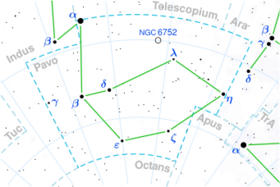Astronomy:Phi1 Pavonis
| Observation data Equinox J2000.0]] (ICRS) | |
|---|---|
| Constellation | Pavo |
| Right ascension | 20h 35m 34.84931s[1] |
| Declination | −60° 34′ 54.3103″[1] |
| Apparent magnitude (V) | 4.75[2] |
| Characteristics | |
| Evolutionary stage | main sequence |
| Spectral type | F0V[3] |
| U−B color index | +0.04[4] |
| B−V color index | +0.29[2] |
| Astrometry | |
| Radial velocity (Rv) | −20.0±4.2[5] km/s |
| Proper motion (μ) | RA: +70.271[1] mas/yr Dec.: −184.963[1] mas/yr |
| Parallax (π) | 35.3436 ± 0.2300[1] mas |
| Distance | 92.3 ± 0.6 ly (28.3 ± 0.2 pc) |
| Absolute magnitude (MV) | 2.53[2] |
| Details | |
| Mass | 1.51[6] M☉ |
| Radius | 1.83+0.15 −0.09[1] R☉ |
| Luminosity | 8.17±0.06[1] L☉ |
| Temperature | 7,209+190 −281[1] K |
| Rotational velocity (v sin i) | 150.0[7] km/s |
| Age | 30+230 −10[8] Myr |
| Other designations | |
| Database references | |
| SIMBAD | data |
Phi1 Pavonis, latinized from φ1 Pavonis, is a single[10] star in the southern constellation of Pavo. It has a yellow-white hue and is faintly visible to the naked eye with an apparent visual magnitude of 4.75.[2] The star is located at a distance of approximately 92 light years away based on parallax. It is drifting closer to the Sun with a radial velocity of −20 km/s.[5]
This is an ordinary F-type main-sequence star with a stellar classification of F0V.[3] It has 1.5[6] times the mass of the Sun and 1.8[1] times the Sun's radius. This is a young star, perhaps 30[8] million years old, and has a high rate of spin with a projected rotational velocity of 150 km/s.[7] It is radiating 8.2[1] times the luminosity of the Sun from its photosphere at an effective temperature of 7,209 K.[1]
Phi1 Pavonis is a candidate debris disk star, although Gray et al. (2006) reported a non-detection of an infrared excess.[3] Nilsson et al. (2010) report a marginal detection, orbiting 74 astronomical unit|AU from the host star with a temperature of 57 K and an estimated 3.1±1.7 times the mass of the Moon.[8]
References
- ↑ 1.00 1.01 1.02 1.03 1.04 1.05 1.06 1.07 1.08 1.09 1.10 Brown, A. G. A. (August 2018). "Gaia Data Release 2: Summary of the contents and survey properties". Astronomy & Astrophysics 616: A1. doi:10.1051/0004-6361/201833051. Bibcode: 2018A&A...616A...1G. Gaia DR2 record for this source at VizieR.
- ↑ 2.0 2.1 2.2 2.3 Anderson, E.; Francis, Ch. (2012). "XHIP: An extended hipparcos compilation". Astronomy Letters 38 (5): 331. doi:10.1134/S1063773712050015. Bibcode: 2012AstL...38..331A. Vizier catalog entry
- ↑ 3.0 3.1 3.2 Gray, R. O. et al. (July 2006), "Contributions to the Nearby Stars (NStars) Project: Spectroscopy of Stars Earlier than M0 within 40 pc-The Southern Sample", The Astronomical Journal 132 (1): 161–170, doi:10.1086/504637, Bibcode: 2006AJ....132..161G
- ↑ Mermilliod, J. C. (2006). "VizieR Online Data Catalog: Homogeneous Means in the UBV System (Mermilliod 1991)". VizieR On-line Data Catalog: II/168. Originally Published in: Institut d'Astronomie 2168. Bibcode: 2006yCat.2168....0M.Vizier catalog entry
- ↑ 5.0 5.1 Gontcharov, G. A. (2006). "Pulkovo Compilation of Radial Velocities for 35 495 Hipparcos stars in a common system". Astronomy Letters 32 (11): 759–771. doi:10.1134/S1063773706110065. Bibcode: 2006AstL...32..759G.
- ↑ 6.0 6.1 David, Trevor J.; Hillenbrand, Lynne A. (2015). "The Ages of Early-Type Stars: Strömgren Photometric Methods Calibrated, Validated, Tested, and Applied to Hosts and Prospective Hosts of Directly Imaged Exoplanets". The Astrophysical Journal 804 (2): 146. doi:10.1088/0004-637X/804/2/146. Bibcode: 2015ApJ...804..146D. Vizier catalog entry
- ↑ 7.0 7.1 Glebocki, R.; Gnacinski, P. (2005). "VizieR Online Data Catalog: Catalog of Stellar Rotational Velocities (Glebocki+ 2005)". VizieR On-line Data Catalog: III/244. Originally Published in: 2005csss...13..571G; 2005yCat.3244....0G 3244. Bibcode: 2005yCat.3244....0G. Vizier catalog entry
- ↑ 8.0 8.1 8.2 Nilsson, R. et al. (July 2010). "Kuiper belts around nearby stars". Astronomy and Astrophysics 518: 15. doi:10.1051/0004-6361/201014444. A40. Bibcode: 2010A&A...518A..40N.
- ↑ "phi01 Pav". SIMBAD. Centre de données astronomiques de Strasbourg. http://simbad.u-strasbg.fr/simbad/sim-basic?Ident=phi01+Pav.
- ↑ Rodriguez, David R.; Zuckerman, B. (February 2012). "Binaries among Debris Disk Stars". The Astrophysical Journal 745 (2): 13. doi:10.1088/0004-637X/745/2/147. 147. Bibcode: 2012ApJ...745..147R.
 |


